新概念英语第三册语法练习:特殊用法及习惯用法
新概念第三册语法总结
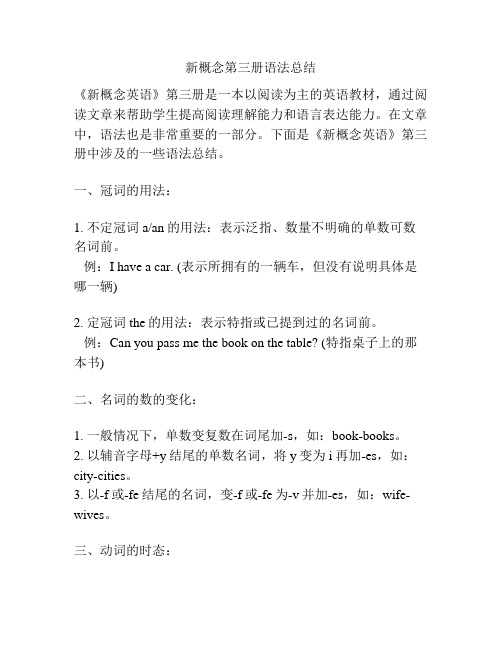
新概念第三册语法总结《新概念英语》第三册是一本以阅读为主的英语教材,通过阅读文章来帮助学生提高阅读理解能力和语言表达能力。
在文章中,语法也是非常重要的一部分。
下面是《新概念英语》第三册中涉及的一些语法总结。
一、冠词的用法:1. 不定冠词a/an的用法:表示泛指、数量不明确的单数可数名词前。
例:I have a car. (表示所拥有的一辆车,但没有说明具体是哪一辆)2. 定冠词the的用法:表示特指或已提到过的名词前。
例:Can you pass me the book on the table? (特指桌子上的那本书)二、名词的数的变化:1. 一般情况下,单数变复数在词尾加-s,如:book-books。
2. 以辅音字母+y结尾的单数名词,将y变为i再加-es,如:city-cities。
3. 以-f或-fe结尾的名词,变-f或-fe为-v并加-es,如:wife-wives。
三、动词的时态:1. 一般现在时:表示习惯性、经常性或客观真理等。
例:Water boils at 100 degrees Celsius. (客观真理)2. 一般过去时:表示过去发生或存在的动作或状态。
例:She lived in London for five years. (过去发生的动作)3. 现在进行时:表示现在正在进行的动作。
例:I am reading a book now. (正在进行的动作)4. 过去进行时:表示过去某一时间正在进行的动作。
例:He was studying when I called him. (过去某一时间正在进行的动作)5. 一般将来时:表示将来某一时间将要发生的动作。
例:I will go to the cinema tomorrow. (将来某一时间将要发生的动作)四、形容词和副词的比较等级:1. 一般形容词比较等级:例:good - better - best (好 - 更好 - 最好)2. 以-y结尾的形容词,变-y为-i,再加-er或-est:例:happy - happier - happiest (快乐 - 更快乐 - 最快乐)五、连词的用法:1. 并列连词and:用于连接并列的词、短语、从句等。
新概念英语第三册重点句型解析整合

今天就一起来学习新概念英语第三册重点句型解析,一起来看看吧,下面小编就和大家分享,来欣赏一下吧。
新概念英语第三册Lesson38重点句型解析1、What is more they will not have to rely solely on the written word.what is more 更有甚者,起到承接上下文的作用,是furthermore,moreover 的意思what is worse 更糟糕的是rely on = count on = depend on 依靠、指望-- you can`t rely on others.-- He can`t be relied on / depended on / counted on.solely adv.地整理发布:kaiziliu=only , just , nearly2、They will be able, as it were, to see and hear us in action.in action 行动中的,活动中的as it were 可以说,似乎,好象,是一个插入语,在语法上是一个独立成分,可以用于任何时态语句中。
-- He is as it were a walking dictionary. 他可以说是一本活字典。
-- Computers can never as it were lead independent lives. 电脑不能过独立的生活。
As it is = in fact = in reality = actually = as a matter of fact 事实上-- I thought things would get better,but as it is ,they are getting worse.-- In many ways children live as it were in a different world from the adults.在许多方面,孩子可以说过着一种与大人完全不同的生活。
新概念英语第三册惯用语Lesson16~18

加替沙星临床不良反应分析及对策摘要】目的总结并分析加替沙星所致临床不良反应及特点,探讨防治措施,为临床安全有效用药提供指导。
方法回顾性分析我院2009-2011年69例加替沙星使用不良反应(ARD)报告。
结果加替沙星主要不良反应为胃肠道反应,其他还包括皮肤过敏反应,神经系统反应,心血管系统反应,泌尿系统反应,糖代谢异常甚至休克等。
结论医务人员临床应用加替沙星应当严格掌握适应症及禁忌症,了解不良反应发生特点,加强对其不良反应,特别是严重不良反应的监测,采取完善防治措施,确保药物使用安全有效。
【关键词】加替沙星不良反应防治措施加替沙星(Gatifloxacin)为第四代氟喹诺酮类抗生素,1999年经美国食品药品监督管理局(FDA)批准上市。
作为新一代抗生素,其具有抗菌谱广,稳定性好,生物利用度高,作用时间持久等特点[1],可有效杀灭革兰阳性菌和革兰阴性菌,对于厌氧菌,支原体,衣原体等的抗菌作用均等于或优于同类药物[2];目前临床上广泛应用于泌尿系统,呼吸系统,消化系统及全身感染治疗。
但是自其上市以来,血糖紊乱,心律失常等不良反应报道逐渐增多[3]。
笔者通过回顾性分析我院2009-2011年69例加替沙星使用不良反应报告,探讨防治措施,为临床安全合理用药提供参考,现报到如下。
1 一般资料与方法1.1 临床资料我院2009-2011年共收到加替沙星使用不良反应(ARD)报告69例;报告所涉及患者中全部为女性,年龄19-65岁,平均35.6岁;年龄分布情况:19-45岁患者44例,占总例数63.8%;40-60岁患者23例,占总例数33.3%;60岁以上患者2例,占总例数2.9%。
1.2 给药方法及反应发生时间全部69例患者中,静脉滴注给药61例,占总例数88.4%,剂量为0.2-0.4g·d-1,溶于5%葡萄糖注射液中;口服给药3例,占总例数4.3%,剂量亦为0.2-0.4g·d-1;联合给药5例,占总例数7.2%。
新概念英语第三册语法精粹汇总
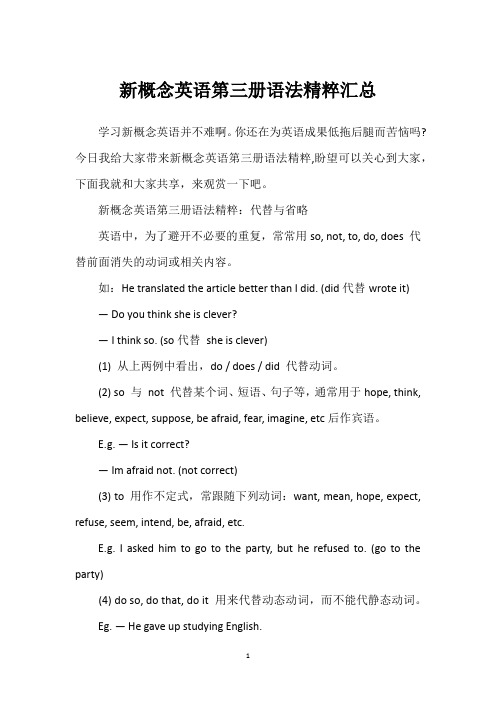
新概念英语第三册语法精粹汇总学习新概念英语并不难啊。
你还在为英语成果低拖后腿而苦恼吗?今日我给大家带来新概念英语第三册语法精粹,盼望可以关心到大家,下面我就和大家共享,来观赏一下吧。
新概念英语第三册语法精粹:代替与省略英语中,为了避开不必要的重复,常常用so, not, to, do, does 代替前面消失的动词或相关内容。
如:He translated the article better than I did. (did代替wrote it)— Do you think she is clever?— I think so. (so代替she is clever)(1) 从上两例中看出,do / does / did 代替动词。
(2) so 与not 代替某个词、短语、句子等,通常用于hope, think, believe, expect, suppose, be afraid, fear, imagine, etc后作宾语。
E.g. — Is it correct?— Im afraid not. (not correct)(3) to 用作不定式,常跟随下列动词:want, mean, hope, expect, refuse, seem, intend, be, afraid, etc.E.g. I asked him to go to the party, but he refused to. (go to the party)(4) do so, do that, do it 用来代替动态动词,而不能代静态动词。
Eg. — He gave up studying English.— Why did he do so? (= give up studying English)— The dish tastes nice.— Yes, so it does. (tastes nice)(此句不能用it does it 或it does so, 因taste属静态动词。
新概念第三册核心语法整理

单元二:倒装句(1)否定词在前的情况完全倒装:谓语部分倒装:助动词(系动词+情态动词)1.no sooner had he arrived than they asked him to l eave again.2.Hardly had he begun to speak when the audience interrupted him.3.Not until he comes back will I go to sl eep(not until 主句部分倒装,从句不倒装)4.Not until 1895 did Cornell University begin to offer a d egree in ornithol ogy.5.Not until linol eum was invented in 1860 did any house have hard-wearing,easy-to-cl ean fl ooring.6.At no time shoul d we divorce ourselves from the masses of the peopl e.(部分倒装)7.Not a singl e paper did he write l ast term.8.Nor for a moment can the man imagine that he woul d die abroad.倒装句(2)让步状语从句形容词/副词/名词+ as/ though +主语+谓语1.much as we may pride ourselves on our god taste, we are no l onger free tochoose the things we want.(副词)2.old as I am, I can still fight.(形容词)3.chil d though he is , he can do some cooking.(名词)动词(原型)+as/though+主语+助动词/情态动词1.try as I might, I coul d not lift the stone.2.Try hard as he will, he never seems abl e to do the word satisfactorily.特殊:as引导的原因状语从句也可以用倒装:tired as she was , I decided not to disturb her.长句:3.great succes s though you have achieved, you must not be conceited.4.Run dry as the see were to and crumble as the rocks were to , I woul d notbreak my promise.5.Only for one year as she has been here, she become quite an expert in thisfiel d.倒装句(3)方位副词前置there, here ,now ,then和up, d own, in , out等副词在句首,要完全倒装1.there appeared on the horizon a man on horseback, riding in my direction.Now comes your luck. Out rushed the littl e boy.主语是代词的时候不用倒装2.here he comes.3.Out he rushed.倒装句(4)补充地点介词短语:1.behind him hang the map.2.In this box is found the book.分词短语:1.lying on the fl oo r was a boy aged about fifteen.2.Discussed in the conference was a proposal to reform income taxes.表语(形容词,过去分词,介词短语):1.invicible are the forces of the pl2.gone are the days when were student s.3.Among the goods are appl es, oranges, bananas····同位语从句why:my original question why he do it has not been answered.Whether: he was again tortured by the doubt whether he coul d meet Mary at the station.单元三:独立主格结构:表示时间,原因,条件,方式和伴随情况自己主语+无动词分句现在分词:weather permitting, I will start tomorrow.过去分词:his homework done , Jim decided to go and see the pl ay.无动词独立结构:the meal over ,we began to work again.不定式独立结构:the detail s to be worked out l ater, the pl an was approved. With 引导的独立主格结构定语:the woman with a baby on her back is my sister原因状语:with his homework finished , he felt very happy.伴随状语:with his face covered tears, he ran into the room. With tears streaming down her cheeks, she sat there .1.sand is formed by the weathering and d ecomposition of all types of rock, it smost abundant mineral constitution being quart s.2.The job finished ,we went home st raight away.3.Two hundred peopl e died in the accident, many of them chil dren.4.There being nothing el se to do ,we l eft.5.I woul d not dare to go home without the job finished.过去分词作宾语补足语(-ed)See,hear,feel ,find ,think·······1.I saw the student s assembled in the hall.2.They found a beautifully-cooked wall et and notes turned to ash.单元四:原因状语从句:because , sine , as , now that, fornow that= seeing that =in that=considering thatthis machine differs from the other one in that it is more powerful.双重否定never fail to: cat s never fail t o fascinate human beingsnot without: he doesn’t have any meal without meat sno not: there is nothing that he can’t d o.单元五:so that 别忘了还有表示结果的意思:we all arrived at 8:00 so that the meeting began promptly.So···that···倒装:主句部分倒装,that从句不倒装1.So great is our passion for doing things for ourselves , that we are becomingincreasingly l ess dependent on specialized l abour.2.So quickly did the workmen finish their work that they were given a bonus.3.So inferior was the quality of the radio that I took it back and asked for abetter one.4.To such a degree was he hurt that he woul d never forgive you.Such+ a +形容词+ 单数名词=so+形容词+a+单数名词1.He was in such a bedraggl ed condition that an assistant refused to serve him.2.He was in so bedraggl ed a condition that····3.It was so hot a day that we went swimming.4.It is such nice weather that I woul d like to o the beach.(weather为不可数名词,只能用such)特殊:当强调的名词前有many, few, litter时,还是用so1.he took so many cases with him that he had to call a taxi2.he earned so littl e money that he coul d barely support his family.让步状语从句:though although (不能用but,但可以用yet强调转折)though she is not pretty, yet she is very l ovely.单元六:现在分词作状语同时发生:flying over the channel , the pil ot saw a meteorite.动作发生在主句之前:having noted d own our names ,the policeman dismissed us.条件状语:you will only make yourself more tired, keeping on your feet.结果:he applied more water to the fl ower, only making things worse.(结果置于句末,多和only 连用)单元七:woul d rather ···than····接动词原型:pl woul d rather pay l arge sums of money than have their life work destroyed by gangsters.It is time / Woul d rather +从句:虚拟语气,宁愿让某人干某事。
新概念英语第三册全部语法.doc
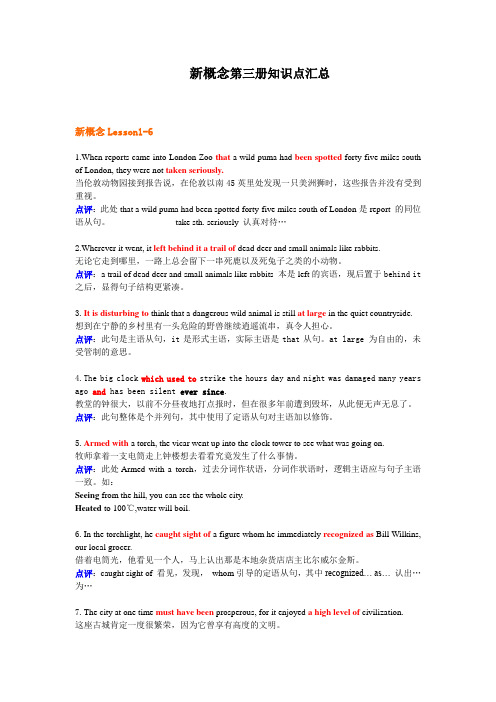
新概念第三册知识点汇总新概念Lesson1-61.When reports came into London Zoo that a wild puma had been spotted forty-five miles south of London, they were not taken seriously.当伦敦动物园接到报告说,在伦敦以南45英里处发现一只美洲狮时,这些报告并没有受到重视。
点评:此处that a wild puma had been spotted forty-five miles south of London是report 的同位语从句。
take sth. seriously 认真对待…2.Wherever it went, it left behind it a trail of dead deer and small animals like rabbits.无论它走到哪里,一路上总会留下一串死鹿以及死兔子之类的小动物。
点评:a trail of dead deer and small animals like rabbits本是left的宾语,现后置于behind it 之后,显得句子结构更紧凑。
3.It is disturbing to think that a dangerous wild animal is still at large in the quiet countryside.想到在宁静的乡村里有一头危险的野兽继续逍遥流串,真令人担心。
点评:此句是主语从句,it是形式主语,实际主语是that从句。
at large 为自由的,未受管制的意思。
4.The big clock which used to strike the hours day and night was damaged many years ago and has been silent ever since.教堂的钟很大,以前不分昼夜地打点报时,但在很多年前遭到毁坏,从此便无声无息了。
新概念英语第三册语法讲解与练习-第三章代替与省略 substitution and omission
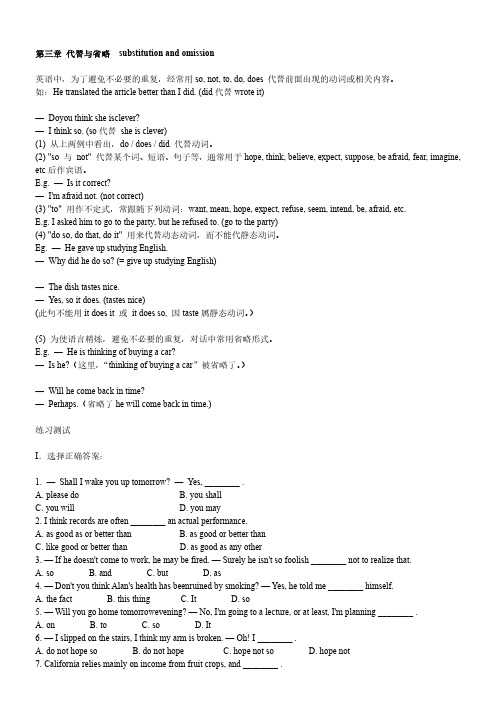
第三章代替与省略substitution and omission英语中,为了避免不必要的重复,经常用so, not, to, do, does 代替前面出现的动词或相关内容。
如:He translated the article better than I did. (did代替wrote it)—Doyou think she isclever?—I think so. (so代替she is clever)(1) 从上两例中看出,do / does / did 代替动词。
(2) "so 与not" 代替某个词、短语、句子等,通常用于hope, think, believe, expect, suppose, be afraid, fear, imagine, etc后作宾语。
E.g. —Is it correct?—I'm afraid not. (not correct)(3) "to" 用作不定式,常跟随下列动词:want, mean, hope, expect, refuse, seem, intend, be, afraid, etc.E.g. I asked him to go to the party, but he refused to. (go to the party)(4) "do so, do that, do it" 用来代替动态动词,而不能代静态动词。
Eg. —He gave up studying English.—Why did he do so? (= give up studying English)—The dish tastes nice.—Yes, so it does. (tastes nice)(此句不能用it does it 或it does so, 因taste属静态动词。
)(5) 为使语言精炼,避免不必要的重复,对话中常用省略形式。
新概念英语第三册语法汇总和习题
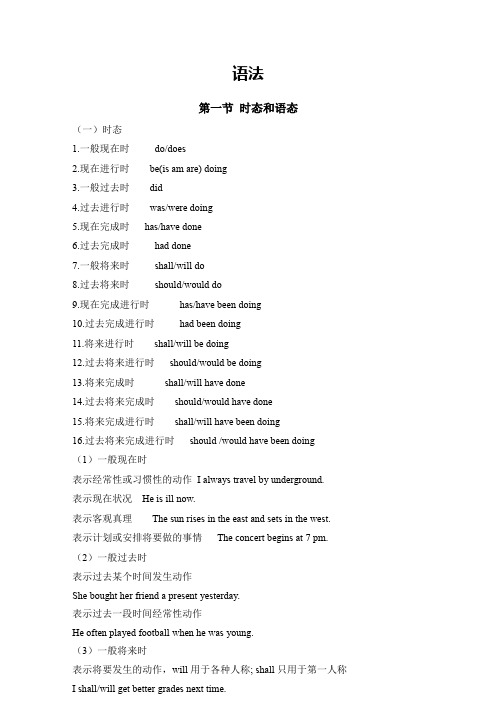
语法第一节时态和语态(一)时态1.一般现在时do/does2.现在进行时be(is am are) doing3.一般过去时did4.过去进行时was/were doing5.现在完成时has/have done6.过去完成时had done7.一般将来时shall/will do8.过去将来时should/would do9.现在完成进行时has/have been doing10.过去完成进行时had been doing11.将来进行时shall/will be doing12.过去将来进行时should/would be doing13.将来完成时shall/will have done14.过去将来完成时should/would have done15.将来完成进行时shall/will have been doing16.过去将来完成进行时should /would have been doing(1)一般现在时表示经常性或习惯性的动作I always travel by underground.表示现在状况He is ill now.表示客观真理The sun rises in the east and sets in the west.表示计划或安排将要做的事情The concert begins at 7 pm.(2)一般过去时表示过去某个时间发生动作She bought her friend a present yesterday.表示过去一段时间经常性动作He often played football when he was young.(3)一般将来时表示将要发生的动作,will用于各种人称; shall只用于第一人称I shall/will get better grades next time.Your parents will be glad to hear that you return home."am / is / are going to+动词原形”用来表示事先考虑过的将要发生的动作Jean is going to meet me at the airport.”be doing”表示根据现在计划或安排做某事I am taking Jane out of dinner tonight.be+(about) to do, 表示近期内要做的事情注意:不能与时间状语连用The new school year is about to start.难点:主将从现时间状语从句:when, whenever, since, till, once, as soon as, while, as ,before, afterI will be an English teacher when I grow up.条件状语从句:if, unless, as long as, so long asIf I have extra money, I will pay the bill for you.(4)现在进行时目前在做的动作He is studying physics very hard these days.现阶段在进行动作I hear you are writing a novel.与always, forever, constantly,continually表达有感情色彩的词汇He is forever asking silly questions like a stupid guy.(5)过去进行时过去某个时刻正在进行动作We were taking photos on the mountains.过去某段时间内的动作I was talking about the new book yesterday morning.(6)将来进行时将来某个时刻正在进行动作When I get home, my mother will be cooking dinner.计划将来要发生的事情She will be studying French at college this time next year.(7)现在完成时已经完成某事,过去的动作对现在有影响We have just e back from the United States.表示过去某一行为持续到现在,可能继续持续下去They have been best mates since school.have been to 曾去过某地,现在已经不在have gone to 已经去了某地,现在可能还在去的路上My father has been to Beijing.My father has gone to Beijing.固定句型:It is the+序数词+time that sb have/has done sth“这是某人第几次去......”It is the first time that his painting has been displayed to the public.(8)过去完成时“过去的过去”:过去某个时间开始一直延续到过去另一个时间的动作I had read half of the book by yesterday.By the time they finished the job, we had reached more.固定句型:It was the+序数词+time that sb had done sth“这是某人第几次去......”It was the second time that I had met the same kind of problem.固定句型:no sooner+过去完成时+than+一般过去时hardly+过去完成时+when+一般过去时scarcely+过去完成时+when+一般过去时“一......就......”They had no sooner reached the office than it began to rain.=They had hardly reached the office when it began to rain.=They had scarcely reached the office when it began to rain.表示过去未曾实现的愿望,与动词intend, mean, plan, hope, wish, want, think, expect 连用I had meant to e ,but something happened.(9)现在完成进行时过去某一时间开始持续到现在,并且继续持续下去I have been waiting for an hour, but he still hasn’t turned up.(10)将来完成时表示将来某时刻之前或某动作前已经发生的动作We shall/wiil have met that manager by next Monday.表示一个持续到将来某时之前或某动作发生之前的动作By next Monday, she will have studied here for three years.(11)过去完成进行时过去某个时间或动作之前一直进行的动作He had been writing this novel up to that time.(12)过去将来时:过去某事看将来要发生的动作John said he would have a rest the next day.(二)语态(1)英语语态:主动语态、被动语态He opened the door. 他打开了这扇门。
新概念英语第三册语法详解和总结(带习题)
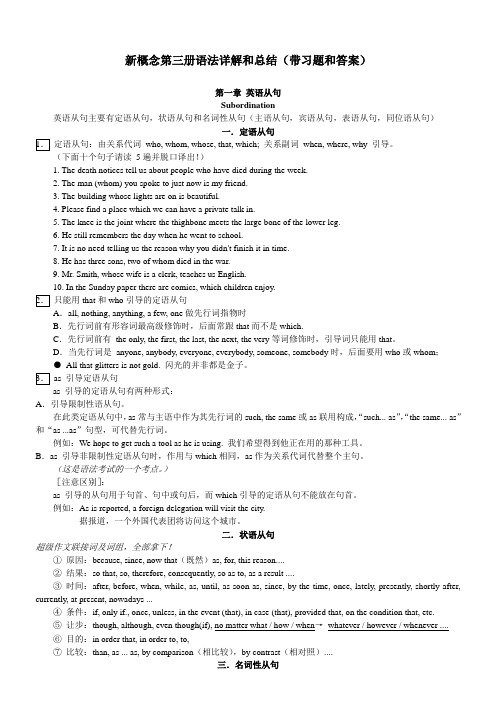
新概念第三册语法详解和总结(带习题和答案)第一章英语从句Subordination英语从句主要有定语从句,状语从句和名词性从句(主语从句,宾语从句,表语从句,同位语从句)一.定语从句定语从句:由关系代词who, whom, whose, that, which; 关系副词when, where, why 引导。
(下面十个句子请读5遍并脱口译出!)1. The death notices tell us about people who have died during the week.2. The man (whom) you spoke to just now is my friend.3. The building whose lights are on is beautiful.4. Please find a place which we can have a private talk in.5. The knee is the joint where the thighbone meets the large bone of the lower leg.6. He still remembers the day when he went to school.7. It is no need telling us the reason why you didn't finish it in time.8. He has three sons, two of whom died in the war.9. Mr. Smith, whose wife is a clerk, teaches us English.10. In the Sunday paper there are comics, which children enjoy.只能用that和who引导的定语从句A.all, nothing, anything, a few, one做先行词指物时B.先行词前有形容词最高级修饰时,后面常跟that而不是which.C.先行词前有the only, the first, the last, the next, the very等词修饰时,引导词只能用that。
新概念3语法总结
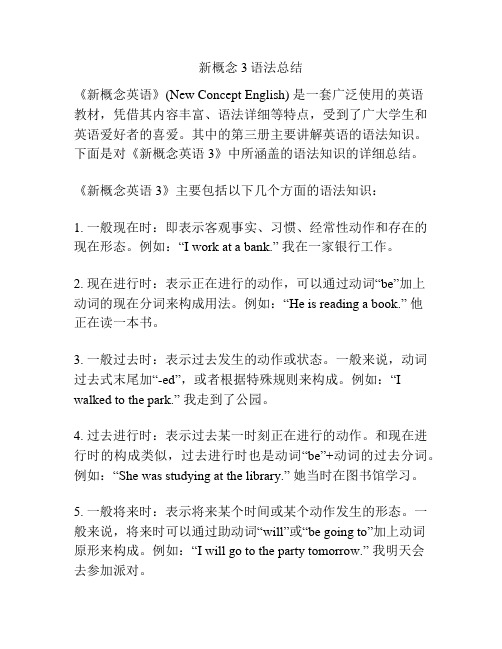
新概念3语法总结《新概念英语》(New Concept English) 是一套广泛使用的英语教材,凭借其内容丰富、语法详细等特点,受到了广大学生和英语爱好者的喜爱。
其中的第三册主要讲解英语的语法知识。
下面是对《新概念英语3》中所涵盖的语法知识的详细总结。
《新概念英语3》主要包括以下几个方面的语法知识:1. 一般现在时:即表示客观事实、习惯、经常性动作和存在的现在形态。
例如:“I work at a bank.” 我在一家银行工作。
2. 现在进行时:表示正在进行的动作,可以通过动词“be”加上动词的现在分词来构成用法。
例如:“He is reading a book.” 他正在读一本书。
3. 一般过去时:表示过去发生的动作或状态。
一般来说,动词过去式末尾加“-ed”,或者根据特殊规则来构成。
例如:“I walked to the park.” 我走到了公园。
4. 过去进行时:表示过去某一时刻正在进行的动作。
和现在进行时的构成类似,过去进行时也是动词“be”+动词的过去分词。
例如:“She was studying at the library.” 她当时在图书馆学习。
5. 一般将来时:表示将来某个时间或某个动作发生的形态。
一般来说,将来时可以通过助动词“will”或“be going to”加上动词原形来构成。
例如:“I will go to the party tomorrow.” 我明天会去参加派对。
6. 现在完成时:表示过去某个时间开始,一直持续到现在的动作。
常常使用助动词“have/has”与动词的过去分词来构成。
例如:“They have lived in London for three years.” 他们已经在伦敦生活了三年。
7. 过去完成时:表示过去某个时间之前发生的动作或状态。
过去完成时由助动词“had”加上动词的过去分词构成。
例如:“She had already finished her homework when I arrived.” 我到达时,她已经完成作业。
新概念英语第三册语法
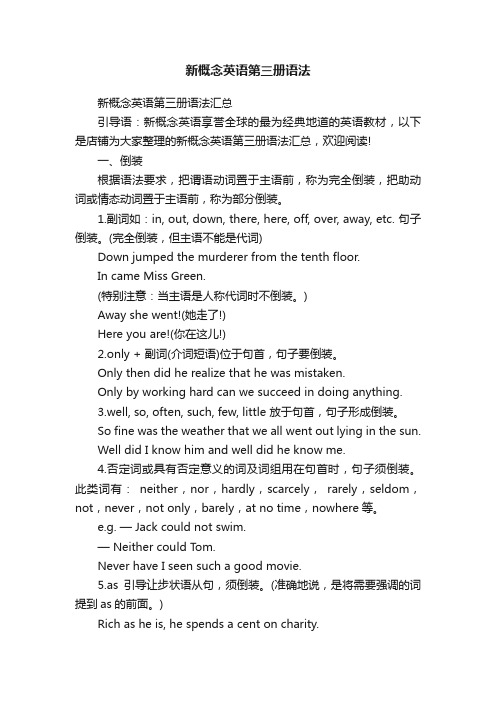
新概念英语第三册语法新概念英语第三册语法汇总引导语:新概念英语享誉全球的最为经典地道的英语教材,以下是店铺为大家整理的新概念英语第三册语法汇总,欢迎阅读!一、倒装根据语法要求,把谓语动词置于主语前,称为完全倒装,把助动词或情态动词置于主语前,称为部分倒装。
1.副词如:in, out, down, there, here, off, over, away, etc. 句子倒装。
(完全倒装,但主语不能是代词)Down jumped the murderer from the tenth floor.In came Miss Green.(特别注意:当主语是人称代词时不倒装。
)Away she went!(她走了!)Here you are!(你在这儿!)2.only + 副词(介词短语)位于句首,句子要倒装。
Only then did he realize that he was mistaken.Only by working hard can we succeed in doing anything.3.well, so, often, such, few, little 放于句首,句子形成倒装。
So fine was the weather that we all went out lying in the sun.Well did I know him and well did he know me.4.否定词或具有否定意义的词及词组用在句首时,句子须倒装。
此类词有:neither,nor,hardly,scarcely,rarely,seldom,not,never,not only,barely,at no time,nowhere等。
e.g. — Jack could not swim.— Neither could T om.Never have I seen such a good movie.5.as引导让步状语从句,须倒装。
新概念英语第三册重点句型解析分享

新概念英语第三册重点句型解析分享新概念英语第三册重点句型解析,我们一起来学习吧,下面我就和大家共享,来观赏一下吧。
新概念英语第三册Lessons13课后习题答案及讲解新概念3课后习题答案:Lesson 13 1d 2c 3c 4c 5b 6b 7b 8c 9a 10d 11a 12b 新概念3课后习题解析:1.because.DShe wanted to know whether that costume was comfortable to wear.2.because.Ctake sb.in 使某人信以为真,让某人上当disguise假装At that moment,she was dressed up as a ghost.She didnt want to frighten the poor man,Shehid as quickly as possible in the small storeroom under the stairs.3.hoped.CKey structure4.Cand前后连接时态要呼应,表示并列关系5.Bhow修饰限定形容词At that moment,she hadnt put on the costume.6.B.not wanting to frighten the poor man.动词不定式的否认形式是在动词不定式符号之前直接加否认词not,neveranxious形容词做缘由状语7.B强调过去的一个动作8.Csee sb.do sth观察某人做某事做宾语补足语时,不定式符号to被省略9.Aat the very moment 就在此刻as long as/so long as 用来引导条件句,表示只要You can go out as long as you pormise to be back before 11 oclockonly when 引导时间状语从句10.Dmiss+动名词,表示错过做什么事情I dont want to miss seeing that film on television tongight forgot to do sth表示遗忘去做某事Yesterday ,I forgot to lock the door.succeed in doing sth.表示胜利做了某事if..happen to.表示某事偶然发生If you happen to pass the bakers,pick me up a brown loaf,would you?If you happen to finish the work early give me a ring.11.Areading 表示仪表或者仪器上的指数、读数What are the temperature readings for the week?take a metre-reading 读电表上的数字measurement 测量尺寸、大小调整稳定Whats your waist measurement?regulation 调整;regulation of body heat体温调整12.Blet out 发出;giveshout 高呼,高喊;有目的的shout to sb 对某人高声喊shout at sb.对某人大喊大叫新概念英语第三册Lessons14课后习题答案及讲解Special difficulties 难点would rather / would sooner would rather do… than do…would rather that… (that宾语从句中要出现动词的过去时)1...go2...left(rather省略了that)3...did not speak4...not speak(would rather do…的否认形式结构:would rather not do…宁愿不做...)5...settled6...didn’t tellMultiple choice questions 多项选择新概念3课后习题答案:Lesson 14 1b 2b 3a 4a 5c 6b 7a 8c 9b 10d 11d 12c 新概念3课后习题解析:(1).bpremises: 房产unharmed替代原文的destroy(2).b他获取自己的名字是根据自己的所作所为(3).ain that=because 因为,表示一种缘由(4).a段时间——for a long time(如今完成式)(5).cprefer doing + to + 动名词(6).bhire: 从某人租得某物(7).aif not: 假如不=unlessprovided---条件是.(8).c介词on和名词death相搭配,表示去世的状态介词on和动名词搭配,表示一个动作。
新概念英语第三册Lesson31~33惯用语(最新)

新概念英语第三册Lesson31惯用语1.add 加,增加,相加;补充说add up 加,加起来,加到一起例句:These figures don't add up right. Let's do the calculation over again.这些数字加起来不对,我们再算一遍吧!2.condition 状态,状况;条件;环境air-conditioned 空调的;有空调的A:I heard on the radio that not only is it going to be super hot tomorrow but also the humidity is going way up.A:我听收音机说明天会特热,而且湿度也会特别高。
B:Sounds like I'm going to have to find an air-conditioned place to be in.B:好像我得找个空调房间待着了。
in the pink of condition/in the pink 身体很好例句:When she came back from the winter vacaition. she was in the pink of condition.她寒假回来的时候,身体很好。
3.conscious adj.有知觉的,意识到,处于清醒状态的budget conscious(因为钱不多)用钱时很小心例句:They are so budget conscious that they never eat out.他们用钱时很小心,从来不在餐馆吃饭。
4.respect vt.尊敬,尊重,n. 尊敬,尊重,问候in...respoct 在…方面(in...point)例句:1.The open university has been a great success in one respect.开放大学在一个方面取得了巨大成功。
新概念英语第三册从句语法讲解课件及习题

④.This is the very dictionary that I want to find .
• I have no idea when he will come back home. • He must answer the question whether he agrees
to it or not.
重点:同位语从句有时不是紧跟 在名次的后面
• The thought came to him ___A___Mary
3、宾语从句:
1)做及物动词的宾语 • I don’t know if(whether) it is interesting. 。 • He doesn’t care if it isn’t a fine day. (从
句是否定句时一般用if引导。 ) • I believe(that) he is honest. • I wonder whether he will come or not. • Everything depends on whether we have
interest to us all. When and where we shall do the test is still in
question. Why she left me is still a mystery to me.
为了避免头重脚轻, It 做形式主语
1. It’s necessary/important,clear +thatclause
新概念三的语法知识点总结
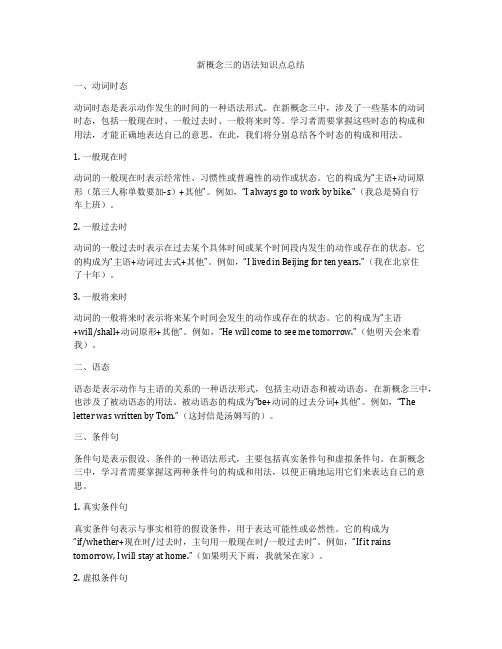
新概念三的语法知识点总结一、动词时态动词时态是表示动作发生的时间的一种语法形式。
在新概念三中,涉及了一些基本的动词时态,包括一般现在时、一般过去时、一般将来时等。
学习者需要掌握这些时态的构成和用法,才能正确地表达自己的意思。
在此,我们将分别总结各个时态的构成和用法。
1. 一般现在时动词的一般现在时表示经常性、习惯性或普遍性的动作或状态。
它的构成为“主语+动词原形(第三人称单数要加-s)+其他”。
例如,“I always go to work by bike.”(我总是骑自行车上班)。
2. 一般过去时动词的一般过去时表示在过去某个具体时间或某个时间段内发生的动作或存在的状态。
它的构成为“主语+动词过去式+其他”。
例如,“I lived in Beijing for ten years.”(我在北京住了十年)。
3. 一般将来时动词的一般将来时表示将来某个时间会发生的动作或存在的状态。
它的构成为“主语+will/shall+动词原形+其他”。
例如,“He will come to see me tomorrow.”(他明天会来看我)。
二、语态语态是表示动作与主语的关系的一种语法形式,包括主动语态和被动语态。
在新概念三中,也涉及了被动语态的用法。
被动语态的构成为“be+动词的过去分词+其他”。
例如,“The letter was written by Tom.”(这封信是汤姆写的)。
三、条件句条件句是表示假设、条件的一种语法形式,主要包括真实条件句和虚拟条件句。
在新概念三中,学习者需要掌握这两种条件句的构成和用法,以便正确地运用它们来表达自己的意思。
1. 真实条件句真实条件句表示与事实相符的假设条件,用于表达可能性或必然性。
它的构成为“if/whether+现在时/过去时,主句用一般现在时/一般过去时”。
例如,“If it rains tomorrow, I will stay at home.”(如果明天下雨,我就呆在家)。
- 1、下载文档前请自行甄别文档内容的完整性,平台不提供额外的编辑、内容补充、找答案等附加服务。
- 2、"仅部分预览"的文档,不可在线预览部分如存在完整性等问题,可反馈申请退款(可完整预览的文档不适用该条件!)。
- 3、如文档侵犯您的权益,请联系客服反馈,我们会尽快为您处理(人工客服工作时间:9:00-18:30)。
新概念英语第三册语法练习:特殊用法及习惯用法
英语中有大量的特殊用法及惯用法,学习者应注意其使用,下面所给练习题为自测题:
1. Advances in medicine have resulted in ________.
A. a longer living expectancy
B. an increase in life expectancy
C. an increase in living
D. more years for everyone
2. The fire department had to be summoned after the bush fire on the corner lot got out of
________.
A. turn
B. the question
C. hand
D. sight
3. I am ________ your temper.
A. fed up by
B. fed up with
C. fed up because of
D. fed up to
4. This kind of work is ________ me.
A. unfamiliar with
B. unfamiliar by
C. unfamiliar to
D. not familiar of
5. Jean ________ a cold when she was in Los Angeles.
A. came by
B. came down with
C. came into
D. came off with
6. All the evidence I have collected ________ to the fact that he is a shop lifter.
A. boils up
B. boils on
C. boils off
D. boils down
7. — Do you like those kinds of cigarette.
— ________ cigarette agrees with me.
A. Hardly no
B. Nearly no
C. Rarely no
D. Almost none
8. — I am surprised that the administration approved of the protest.
— I am too. It usually frowns ________ such demonstration.
A. on
B. with
C. for
D. to
9. — Does Jone have brown hair?
— Yes, in fact it's quite similar in shape ________ yours.
A. as
B. with
C. to
D. like
10. — I thought you had planned to practice the piano today. — I did nothing but ________ letter all day.
A. write
B. to write
C. wrote
D. writing
11. — I think John will win the race. — Yes, he started off ________ a great speed.
A. with
B. at
C. through
D. by
12. Jim Thorpe, Pennsylvania, a town in the eastern part of the state, was named ________ one of the greatest American athletes.
A. in honor of
B. the honors
C. for honored
D. to honoring
13. — Are you still trying to convince him? — No, there is no point ________ with him.
A. by arguing
B. for arguing
C. with arguing
D. in arguing
14. Thanks to modern irrigation, crops now grow abundantly in areas where once ________ cacti and sagebrush could live.
A. nor
B. not the
C. none other
D. nothing but
15. — Can you ride a horse? — No, I never had the chance ________.
A. for learning it
B. for learning how
C. how to learn it
D. to learn how。
